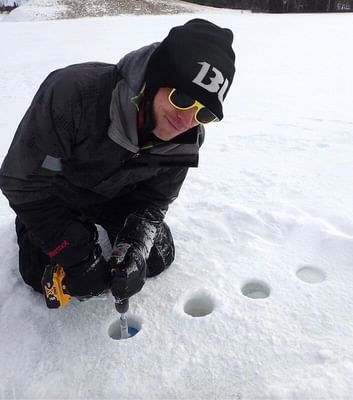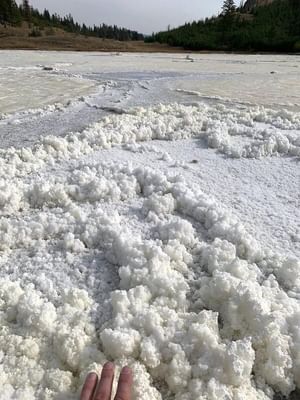- Undergraduate
Bachelor's Degrees
Bachelor of ArtsBachelor of EngineeringDual-Degree ProgramUndergraduate AdmissionsUndergraduate Experience
- Graduate
Graduate Experience
- Research
- Entrepreneurship
- Community
- About
-
Search
All Thayer News


Dartmouth Research Engineer Receives Planetary Society STEP Grant
May 31, 2023 | The Planetary Society
Research engineer Jacob Buffo is PI on one of just two projects selected for funding by The Planetary Society's "Science and Technology Empowered by the Public" (STEP) grant program. "The grant will fund field work to study hypersaline lake systems in central British Columbia, Canada for me and six co-investigators across six different institutions," says Buffo. The lakes are analogous to what may exist on other planets and moons, and can provide insights into what is possible in the conditions we think occur there.

Jacob Buffo collects ice samples at Last Chance Lake in British Columbia. (Photo: Chris Carr / Georgia Tech)
Adapted from The Planetary Society's grant announcement:
Although nowhere on Earth is identical to another planet or moon's environment, there are places where conditions are analogous—similar enough in certain respects to be worth studying. Buffo and his team were awarded $49,284 to study small, extremely salty lakes in British Columbia that may be analogous to ancient Mars as well as some of the Solar System's ocean moons, places of key interest in the search for life.
Liquid water is one of the few things required by all life on Earth, and so worlds such as Mars, Europa, and Enceladus that have evidence of past or present liquid water are important in the search for life beyond our planet. The water on these worlds is often salty, which allows it to remain liquid at colder temperatures. Studying salty water environments on Earth can give us insights into what these alien environments may be like, including whether they could be habitable.
Not every saltwater body on Earth is analogous to salty alien waters, though. The salt in Earth's oceans is mostly table salt (NaCl), which is not as prevalent in the salts found on Mars and in the subsurface oceans of Europa and Enceladus. Buffo's project would study lakes containing sodium carbonate (Na2CO3), sodium sulfate (Na2SO4), and magnesium sulfate (MgSO4), which more closely mirror the compositions of these alien oceans.

A close-up of one of the small, hypersaline lakes on British Columbia's Cariboo Plateau that will be extensively studied. (Photo by Jacob Buffo)
The project, called "Multiscale Characterization of Brine-Rich Planetary Analog Environments," will use a wide variety of data collected at different scales and distances: from spacecraft to drones to in-person sampling. This will allow the team to not only learn about these analogues to exotic planetary locations, but also learn about efficient ways to use remote-sensing data (data taken from a distance) to choose locations that are the most interesting to be studied in greater detail up close. This is similar to what is typically done in planetary exploration, going from orbital data to landers and rovers on the surface.
In year one, they will carry out field investigations to create multiscale (physical, spectral, thermal, electromagnetic, and biogeochemical) profiles of the ice-brine-sediment systems of five distinct lake systems in British Columbia’s Cariboo Plateau. In year two, they’ll use what they have learned to predict what they will find at two additional unexplored lakes, carrying out a simulated planetary mission to evaluate their methodology and their science. The team will create a database from their data that will be accessible to other scientists and the public.
The team includes specializations in remote sensing, geochemistry, astrobiology, planetary analog systems, biogeochemistry, geobiology, planetary science, and geophysics. Buffo is joined by a number of co-investigators at a variety of institutions, each bringing their own expertise and often instrumentation to the project: Alexandra Pontefract at Georgetown University; Magdalena Osburn and graduate student Floyd Nichols at Northwestern University; Mitchell Barklage of the Illinois State Geological Survey and Northwestern University; graduate student Emma Brown at Arizona State University; and graduate student Emmy B. Hughes at the Georgia Institute of Technology.
For over 40 years, Planetary Society members and donors have crowdfunded science and technology projects that advance space science and exploration. The STEP grant program continues this tradition by funding innovative projects that are chosen through an open, international, competitive process.
Listen to a Planetary Society podcast featuring Jacob Buffo:
Link to source:
For contacts and other media information visit our Media Resources page.
